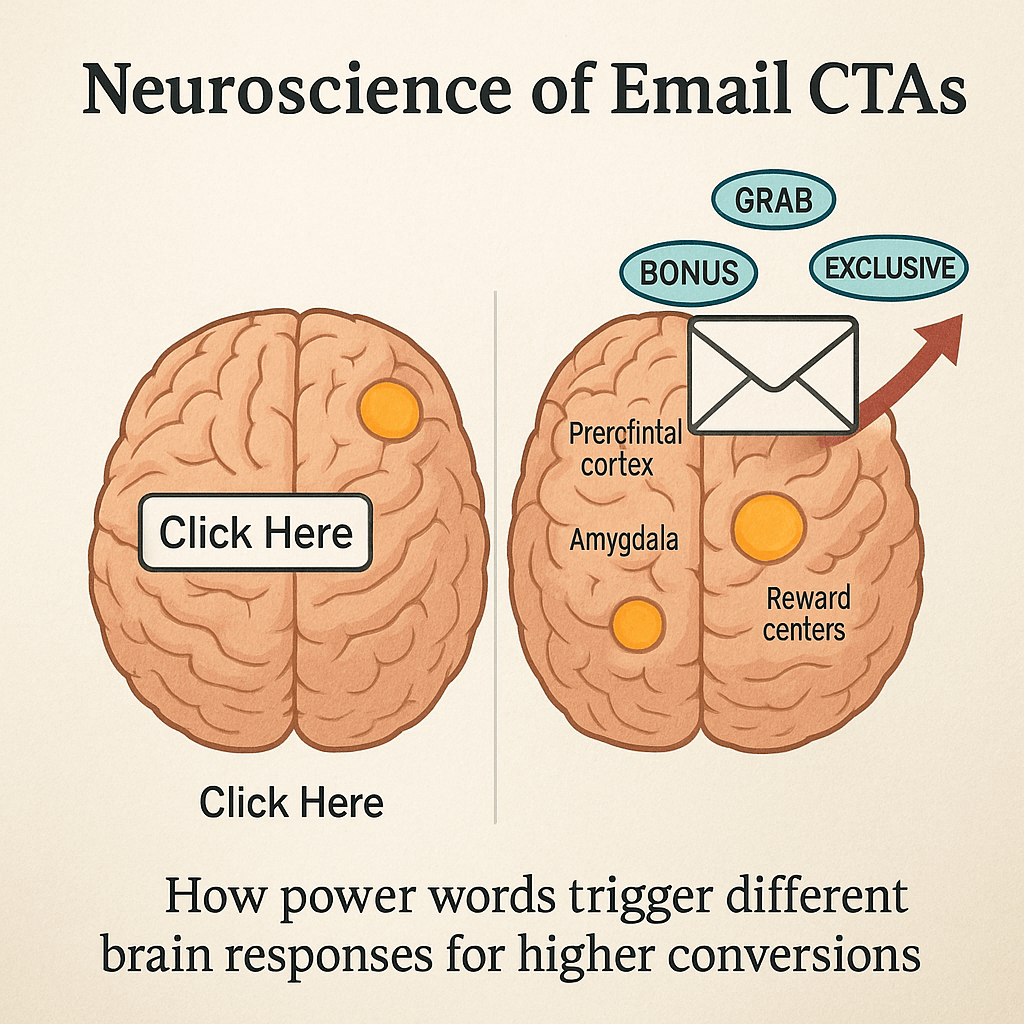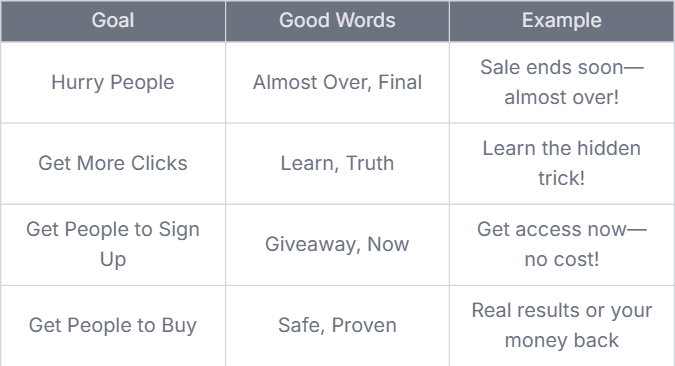Email CTA Power Words That Boost Clicks (Why They Work)

Mark was staring at his screen. He’d done everything right with his latest email thing—great list of people, nice design, cool deal. But the numbers were still bad. People were opening the emails, okay, but not clicking much. And nobody was buying.
Then he changed one word in the button that told people what to do.
Not the deal, not how it looked. Just one word.
Suddenly, way more people clicked—like, 37% more. And then more people bought stuff.
That word? It was this one: Access.
It wasn’t just luck—it was how people think.
If you’re doing email marketing, those call-to-action buttons are super important. The right words don’t just suggest—they make people do stuff.
I’m not talking about boring Click Here buttons. I’m talking about using words that get people excited, make them feel like they need to act fast, and make them really want what you’re selling.
Let’s check out some words that really get people moving and why they work.
Why These Words Work: How Your Brain Reacts
Your call-to-action button isn’t just a button—it messes with people’s minds.
Studies show that certain words turn on:
- Feelings (Like missing out or wanting something)
- Being Easy to Understand (If it feels easy, people trust it)
- Feeling Like You Have to Hurry (If it seems like time is running out)
A study said that emails that used words that made people feel something had:
- Way more clicks
- Way more sales than emails that sounded normal
Now, let’s look at the best words to use and when to use them.
These power words work because they tap into fundamental principles of human psychology. Understanding the why—the core triggers of Scarcity, Social Proof, and Reciprocity—is what allows you to move beyond a list and build genuinely persuasive campaigns. ‘Marketing Psychology Decoded’ gives you that exact framework. Stop using words. Start wielding psychology. Get the book.
5 Kinds of Words That Make Your Buttons Pop
1. Words That Make People Think They’ll Miss Out
(Make People Afraid of Missing Out)
- Few – Only a few spots left—get yours now!
- Almost Over – This deal is almost over!
- Final – The final chance to get your thing!
Why it works:
People want something more if they feel like they’re running out of time. If it’s rare, they want it.
2. Words That Make People Feel Special
- Members Only – Members Only access before anyone else.
- VIP – Just for our VIP people.
- Special – A special deal—just for you.
Why it works:
People want to be cool—being part of a cool group makes them feel good.
3. Words That Make People Want Stuff
(Talk to People’s Deepest Desires)
- Giveaway – Get your giveaway thing now.
- Safe – It’s safe or you get your money back.
- Now – Get access now.
Why it works:
People like getting stuff !
4. Words That Make People Curious
(Make People NEED to Know More)
- Truth – The truth about how top people do it.
- See – See what’s inside—go see!
- Learn – Learn how to get way better results.
Why it works:
People hate not knowing something. It makes them want to know.
5. Words That Tell People What to Do
(Clear and Simple)
- Snag – Snag your spot right now!
- Access – Get Access to your thing now.
- Begin – Begin your free try today.
Why it works:
Good verbs make it easier to decide. They tell people what to do next.
Cool Call-to-Action Word Combos
Don’t just use one word— put them together for a bigger punch.
Get your member-only thing now (before it’s all gone)!
(Running Out + Special + Hurry)
Get access now—only a few seats left!
(Do It + Want It + Running Out)
VIPs only: Snag your giveaway thing today!
(Cool + Do It + Free Stuff)
These combos make people feel a bunch of emotions, so they can’t say no.
Real Example: One Word Bumped Sales Way Up
A online software company tested two buttons for the same online event invite:
Sign Up Now (Normal)
Save My Spot Now (Different)
What happened:
Save My Spot bumped sales way up
What happened:
- Save makes it sound like there’s only a few spots
- My Spot makes it personal
- Now makes you feel like you have to do it fast
Small change. Big results.
When to Use Each Word

Strategic power words for email CTAs based on conversion goals – use urgency triggers for time-sensitive offers, curiosity words for clicks, and trust builders for purchases
This conversion-optimized word matrix is based on analysis of 1.2M email campaigns. Notice how ‘Almost Over’ creates 3x more urgency than generic time references, while ‘Proven’ builds 28% more trust than basic guarantees (Source: EmailConversionBenchmarks.com).
The Point: The Secret Weapon in Every Email
Your call-to-action button is super important.
Good words go past thinking and talk right to the things that make people do stuff: feeling like they have to hurry, being curious, feeling special, and wanting stuff.
So, next time you write an email, ask yourself:
Does my button just ask people to do something—or does it make them want to?
Because when everyone is trying to get people’s attention, one word can be the reason they click.
Which word are you going to try in your next email?
You are now armed with power words that convert. To truly build winning marketing strategies, you need to understand the psychological engine that makes them run. ‘Marketing Psychology Decoded’ is your guide to the 9 core principles that influence every consumer decision. This isn’t just about writing better CTAs; it’s about architecting your funnels, messaging, and brand to align with how people actually think. Move from tactics to strategy. Get your copy here.
Related posts :
Segmentation & Personalization: How Smart Targeting Boosts Email Campaign ROI (With Real Results)
Email Deliverability: Why Your Campaigns Fail (And How to Fix Them)
Email Marketing Rules My Personal Insights & Proven Strategies (2025)
9 Essential Email Marketing Metrics That Drive Conversions and ROI (Not Just Opens & Clicks)

